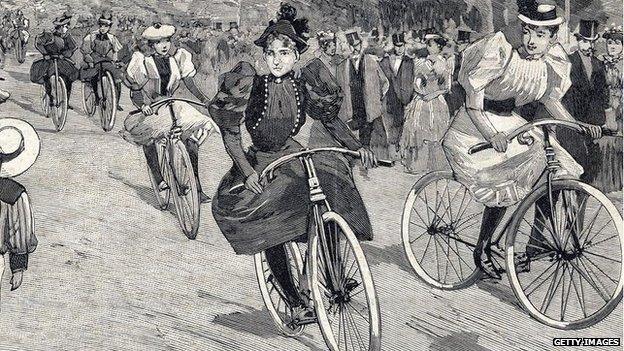The Vocabularist: Where does the word 'deflation' come from?
- Published

Whether to use the word "deflation" caused furrowed brows in the past week when average prices fell for the first time since 1960.
The BBC's economics editor said many economists were "desperately anxious" that he should not use "the 'd' word".
After decades of complaints about inflation, it might seem surprising that people wished to avoid using a word which suggests the opposite. There were concerns that it should only be "deflation" if prices went on falling.
But headline writers anxious for brevity rushed to say Britain was "in deflation" (though no-one ever said it was "in inflation"). Which sounded bad, like "in recession".
Also deflation sounds sad - just as we say a proud or hopeful person is "deflated" by a disappointment. It makes the country seem like a squashy old football lying forgotten in a shed.
"Inflation" is the classical Latin word "inflatio" from "inflo", combining in and flo, meaning blow.
Latin also has "deflo", from flo and de (meaning "from"). The agricultural author Varro writes of impurities in olive oil being "deflatum", external - blown away.
Some Roman somewhere may have used the word deflatio (though it is not recorded). But that is not where our word deflation comes from. If it existed in Latin, "deflatio" would have meant "blowing away".
"Inflation" was a word in Latin and other languages for many centuries before "deflation" appeared.

The word came into use during the bicycle boom of the 1890s
Nor was inflation a very common word in English at first. It rarely meant blowing air into things, but more often had unpleasant overtones which it also had in Latin - sometimes meaning swelling, or flatulence (which also comes from "flo") or excess.
In 19th Century America, external, "inflation" began to be used to criticise the actions of governments putting too much money into circulation, causing prices to rise. Later it was used loosely to mean the rise in prices itself.
A word for the opposite - both letting air out of something, and restricting money and prices - would be needed sooner or later, but it was only in the 1890s that "deflate" and "deflation" came into use.
Why then? Suddenly inflating and deflating had become familiar to millions, for the 1890s was the time of the bicycle boom, when "safety cycles" with chain drives as we know today became widely available and hordes of ordinary people took to the rugged roads - and had to care for their suffering tyres.
And in the cycling column of the Pall Mall Gazette in August 1891 a new word appears: "Good news for the oft-suffering users of pneumatic tyres… a new patent valve, possessing the long-desired means for deflation as well as inflation."
The figurative use followed - HG Wells's War in the Air in 1912 has a character "left in an extremely deflated condition".
When "deflation" was first used by economists is not known, but Sir Ralph Hawtrey's 1919 book Currency and Credit, external uses it several times.
The new arrival had quickly made itself at home - though still people are "desperately anxious" about what exactly it means.

The Vocabularist

Subscribe to the BBC News Magazine's email newsletter to get articles sent to your inbox.